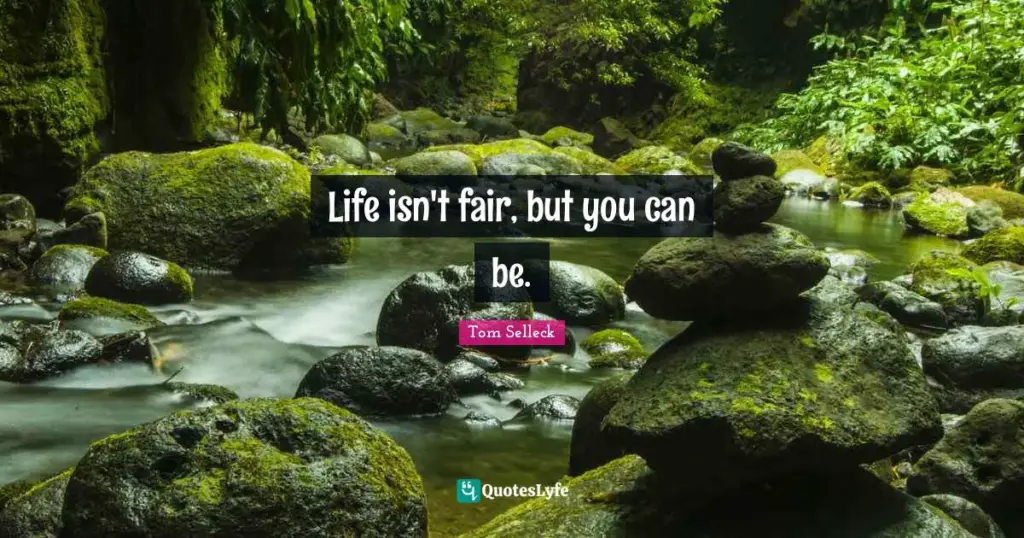
Life Isn’t Fair: Navigating Inequity and Building Resilience
The phrase “life isn’t fair” is a common refrain, often uttered in moments of frustration, disappointment, or perceived injustice. While seemingly simple, this statement encapsulates a profound truth about the human experience. Understanding why life often feels unfair and developing strategies to cope with inequity are crucial for building resilience, fostering empathy, and creating a more just world. This article delves into the multifaceted nature of fairness, explores the reasons behind its perceived absence, and offers practical guidance on navigating the inherent unfairness of life.
Understanding Fairness: A Complex Concept
Fairness is a deeply ingrained human value, rooted in our innate sense of justice and equality. From childhood, we are taught the importance of sharing, taking turns, and treating others as we wish to be treated. However, the concept of fairness is far from straightforward. What one person considers fair, another may perceive as unjust, depending on their individual circumstances, perspectives, and values. There are different types of fairness, including:
- Distributive Fairness: This refers to the perceived fairness of the outcomes or resources distributed among individuals or groups. It often involves questions of equity, equality, and need.
- Procedural Fairness: This concerns the fairness of the processes used to make decisions or allocate resources. It emphasizes transparency, impartiality, and the opportunity for individuals to voice their concerns.
- Interactional Fairness: This focuses on the way individuals are treated during interactions. It involves demonstrating respect, empathy, and honesty.
When these different types of fairness are violated, it can lead to feelings of resentment, anger, and disillusionment. The perception that life isn’t fair often stems from a combination of these violations.
Why Life Often Feels Unfair
Several factors contribute to the pervasive feeling that life isn’t fair. These factors can be broadly categorized into:
Inherent Inequalities
We are not all born equal. Genetic predispositions, socioeconomic backgrounds, and access to opportunities vary widely. Some individuals are born into privilege, with access to quality education, healthcare, and social networks, while others face systemic barriers and disadvantages. These inherent inequalities create an uneven playing field, making it more challenging for some to achieve their goals. This is why many believe that life isn’t fair from the start.
Random Chance and Unforeseen Events
Life is full of unpredictable events that can significantly impact our lives. Accidents, illnesses, natural disasters, and economic downturns can disrupt our plans and lead to unexpected hardships. These events often feel arbitrary and unjust, reinforcing the notion that life isn’t fair. The element of chance plays a significant role in shaping our experiences, regardless of our efforts or intentions.
Human Biases and Discrimination
Despite our best intentions, human beings are prone to biases and prejudices that can lead to unfair treatment. These biases can be conscious or unconscious and can manifest in various forms, including racism, sexism, ageism, and ableism. Discrimination based on these biases can limit opportunities and perpetuate inequality, contributing to the feeling that life isn’t fair for certain groups.
The Illusion of Control
We often overestimate our ability to control our lives and outcomes. While hard work and determination are important, they are not always sufficient to guarantee success. External factors, such as market conditions, political instability, and technological disruptions, can significantly impact our prospects. Recognizing the limits of our control is crucial for managing expectations and coping with disappointment when life isn’t fair.
Coping Strategies: Building Resilience in the Face of Inequity
While we cannot eliminate the inherent unfairness of life, we can develop strategies to cope with it and build resilience. Here are some practical approaches:
Acknowledge and Validate Your Feelings
It is important to acknowledge and validate your feelings of frustration, anger, or sadness when you experience unfairness. Suppressing these emotions can lead to increased stress and resentment. Allow yourself to feel your emotions without judgment and seek support from trusted friends, family members, or mental health professionals. Recognizing that feeling this way is normal when life isn’t fair can be the first step to healing.
Focus on What You Can Control
Instead of dwelling on the things you cannot control, focus on the aspects of your life that you can influence. This might include your attitude, your effort, your choices, and your relationships. By taking proactive steps to improve your situation, you can regain a sense of agency and empowerment. Even when life isn’t fair, you can control how you respond to the challenges you face.
Practice Gratitude
Cultivating gratitude can help shift your perspective from what you lack to what you have. Take time each day to appreciate the positive aspects of your life, such as your health, your relationships, and your opportunities. Gratitude can help you build resilience and find joy even in the face of adversity. Remembering what you have, even when life isn’t fair, can make a big difference.
Develop Empathy and Compassion
Recognizing that others also experience unfairness can help you develop empathy and compassion. By understanding the struggles of others, you can broaden your perspective and connect with people on a deeper level. Empathy can also motivate you to advocate for social justice and work towards creating a more equitable world. Knowing that you’re not alone in feeling that life isn’t fair can be comforting.
Seek Support and Build a Strong Network
Having a strong support network can provide emotional support, practical assistance, and valuable perspective during challenging times. Surround yourself with people who are supportive, understanding, and encouraging. Don’t hesitate to ask for help when you need it. Connecting with others who understand that life isn’t fair can provide a sense of community.
Advocate for Change
If you witness or experience unfairness, consider taking action to advocate for change. This might involve speaking out against discrimination, supporting organizations that promote social justice, or participating in political activism. By working towards a more equitable world, you can create a positive impact and contribute to a more just society. Even when life isn’t fair, you can fight for change.
Reframe Your Perspective
Sometimes, reframing your perspective can help you cope with unfairness. Instead of viewing setbacks as failures, consider them learning opportunities. Instead of focusing on what you lack, appreciate what you have. By adopting a more positive and resilient mindset, you can navigate the challenges of life with greater ease. Accepting that life isn’t fair and adapting your mindset can be powerful.
Practice Self-Care
Taking care of your physical and mental health is essential for building resilience. Make sure to get enough sleep, eat a healthy diet, exercise regularly, and engage in activities that you enjoy. Prioritizing self-care can help you manage stress, boost your mood, and improve your overall well-being. When life isn’t fair, self-care is crucial.
Set Realistic Expectations
Avoid setting unrealistic expectations for yourself and others. Recognize that setbacks and disappointments are inevitable and that perfection is unattainable. By setting more realistic goals, you can reduce your vulnerability to frustration and disappointment. Understanding that life isn’t fair means setting expectations accordingly.
The Importance of Fairness in Society
While individual resilience is crucial, addressing systemic unfairness is equally important. A society that values fairness and equality is more likely to be stable, prosperous, and just. Governments, organizations, and individuals all have a role to play in promoting fairness and reducing inequality. This involves:
- Implementing fair policies and laws: Ensuring that laws and policies are applied equally to all individuals, regardless of their background or circumstances.
- Promoting equal opportunity: Providing access to education, healthcare, and employment opportunities for all.
- Combating discrimination: Challenging and dismantling discriminatory practices and attitudes.
- Investing in social programs: Providing support for vulnerable populations and addressing systemic inequalities.
By working together to create a more equitable society, we can reduce the feeling that life isn’t fair and create a better future for all.
Conclusion
The statement “life isn’t fair” is a reflection of the inherent inequalities, random events, and human biases that shape our experiences. While we cannot eliminate unfairness completely, we can develop strategies to cope with it, build resilience, and advocate for a more just world. By acknowledging our feelings, focusing on what we can control, practicing gratitude, developing empathy, seeking support, and working towards change, we can navigate the challenges of life with greater strength and purpose. Ultimately, accepting the inherent unfairness of life can empower us to live more authentically, compassionately, and meaningfully. It is important to remember that while life isn’t fair, that doesn’t mean we can’t strive to make it more equitable for ourselves and others. Understanding this truth is key to building a more resilient and just society.
[See also: The Importance of Social Justice]
[See also: Building Resilience in the Face of Adversity]

